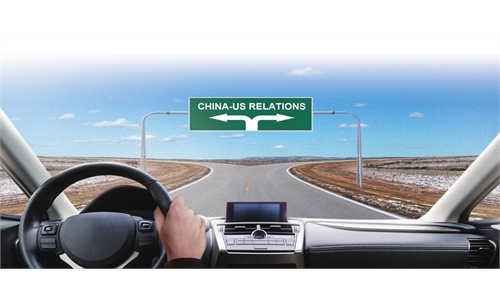It behooves US, China to work together to handle any and all black swan events: Robert Kuhn

Illustration: Liu Xidan/Global Times
Editor's Note:After the 2020 US presidential elections, Dr. Robert Lawrence Kuhn (Kuhn), chairman of The Kuhn Foundation and recipient of the China Reform Friendship Medal (2018), told the Global Times (GT) that there would be a "window of opportunity for resetting China-US relations." A year has passed. What are the China-US ties like in Kuhn's eyes? Where is the bottom line of the US' China Policy? Will the Biden administration soften its hostile attitude toward China? Dr. Kuhn shared recently his insights with GT through a video talk. The following are the excerpts.
GT: Last year, you said about China-US relations, "Worst case: the free fall in US-China relations won't halt until both sides see blood. Best case: After the 2020 elections, a window of opportunity will open to reset relations." How do you evaluate the China-US relations in 2021? Are the two countries about to reset their relationship?
Kuhn: When I assessed US-China relations at the end of 2020, I meant figurative "blood," not literal bleeding. Sadly, the past year has increased the possibility of kinetic conflict, though I still put the probability of hot war as low. As to whether the two countries can reset their relations, I can pretend to be hopeful, but, short term at least, I am not blindly optimistic. Events during the year have exacerbated tensions, hardened emotions. One can be forgiven for feeling overwhelmed by the cascading deterioration.
To make progress, I am looking for the bottom. When is the nadir, the lowest point, in US-China relations? Have we past it? Or is it yet to come? If we can recognize the bottom, that means from then on, we can see improvement, even if incremental and slow.
The first task is to not make things worse. Because if bilateral relations stop getting worse, then we can say that we've found the bottom. And once we've found the bottom - embedding all of the tough China-US issues - there would be many topics on which both sides would want to cooperate.
I was hopeful that the recent teleconference between President Xi Jinping and President Joe Biden, which was constructive at least in its comprehensiveness and candor, would mark the moment when the bottom had been passed, as if a high-tensile-strength floor had been established in China-US relations. For example, agreements for increased dialogue among critical constituencies: diplomacy, commerce/trade, military. Frankly, though, given events even since the presidential exchange, it is not clear that we have yet found that illusive bottom. I'm hopeful that we have, but only the future will tell.
GT: Do you think the US is still trying to sound out China's bottom line or is it trying to push that bottom deeper?
Kuhn: Each side needs to look at the other side's positions from the other side's perspectives. China may be asking how far will the US go to pressure its core interests? For example, congressional bills on Xinjiang, the "diplomatic boycott" of the Winter Olympics, perceived encouragement for "Taiwan quasi-independence."
The US may be asking how far will China go to expand its control or influence beyond its borders? Few now in authority in the US, in State or National Security or the military, would think they are trying to push China to find a deeper bottom line. From their perspective, they are resisting what they feel is China's increasingly aggressive intent in several areas.
Each side is reacting to the other side's moves; while this is normal, it is not good. Each side thinks they are reactive to the other side's provocations, not proactive in initiating the provocations, in making relations worse. The outcome is that the mutual moves become a "vicious cycle," positive feedback that amplifies attitudes in the wrong direction. If the US and China continue down this path, it means the bottom has not been reached — and this vicious positive feedback cycle of each side thinking they're defending their own interests when they're actually provoking the other side, will work to dig a bottom even deeper.
Once again, our cautious hope is that the Biden-Xi talk put a stop to making things worse, putting a hard floor under the bottom, but we will have to see.
GT: In your view, where is the bottom line for the US' China Policy? Is the Biden administration capable of preventing interest groups from kidnapping the entire China-US relationship?
Kuhn: A proper analysis of US-China relations should include the domestic situation of each country. (Whenever I analyze US-China relations, I try to apply similar frameworks or metrics to the US and China equally.) It is certainly true that politics and public pressures exist in both countries. Nationalism is a human trait, bread in our bones by evolution. Animal groups protect territories. We human beings have different kinds of territories, but it is fundamentally the same: "in-group" versus "out-group."
In the US, it's not so much "interest groups" that are lobbying against China because the strongest such groups, especially the business community, would love to do a lot more business in China. They would love to see the US-imposed tariffs eliminated or much reduced. They would love expanded openness on both sides because that's what enables business growth and financial gain.
But what we have in both countries, sadly, is a precipitous decline in public opinion toward the other side. Negatives in both countries are upwards of 70 percent, much of it very negative. I've witnessed personal friends, people who in the past had no interest in China - not positive, not negative, they just didn't care - become affirmatively negative. It's a real problem, pressuring the Biden administration.
In the US, 2022 is a mid-term election year of consequence, because Democratic control of the House and Senate is slim and threatened. Thus, to hold the two bodies of Congress, Democrats are scrambling to reverse worrying trends, and while China is not among the most potent issues in US politics, it is on the list (perhaps 5th or 6th in voter concern). If the Biden administration is perceived to be "soft" or "weak" on China, that would hurt Democrats in the election. Republicans, without doubt, will label Democrats as "soft" or "weak" on China.
Likewise, in China in 2022, there is a major political event: the 20th National Congress of the Communist Party of China (CPC). Held every five years, the CPC National Congress is the most important event in the country's political system, and so from China's point of view, this is a year to prioritize stability - economic, social and diplomatic stability.
Here's the point: Due to surging nationalism in each country, to compromise, to seek middle positions, may seem, in the emotional eyes of public opinion, "soft" or "weak" - whether in the US versus China or in China versus the US - and such epithets could be politically detrimental in this sensitive year.
I'd like to hope that the leaders on both sides will have the perspicacity and the wisdom to not make relations worse, and thus to give time an opportunity to make relations better. Truth to tell, it takes strength to compromise.
GT: You have spoken about the domestic situation in the US. It is believed there is plenty of room for the two countries to cooperate. Particularly, China can help the US address some of its domestic problems. To what extent do you think the Biden administration will soften its hostile attitude toward China? Or because of the mid-term elections, will the US not show any softness toward China?
Kuhn: Politicians in electoral systems must attract voters, and surely must not alienate voters, which is why tracking public opinion is vital. In the US, politics is largely in the open, transparent, and amplified by independent media. That's the way the system works.
Biden has been accused of being "soft on China." There has been acrimonious reporting about his son's engagement with China. The politics can get dirty. Yet, the Biden administration, staffed by seasoned professionals, is going to continue to focus on what they believe is the right China policy. Frankly, they don't have it fully together. They have conducted a complete review of US' China policy, but they still lack a fully coherent policy. What has been coherent is the Biden administration reaching out to some like-minded countries to assemble a unified, multilateral approach to China. But still, the policies to pursue are not clear.
American policymakers and think tank experts have been engaged in vigorous debate on US' China policy, some of it in public forums. The most sensitive issue is obviously Taiwan.
From the Chinese mainland's perspective, the DPP (Democratic Progressive Party), in power, has created tensions with moves toward increasing "independence." The mainland has been staging various kinds of PLA military maneuvers, including large numbers of war planes, including bombers, heading toward Taiwan airspace. This is causing concern in the US and other countries, because it looks like testing or rehearsing for military action. However, from the Chinese mainland's point of view, these military maneuvers are preventing conflict by warning Taiwan's leadership that they should not even think about any sort of moves toward "independence."
From the US point of view, if the Chinese mainland were to use force and take Taiwan, that would represent the most dramatic decline in American power and leadership - not just in Asia but in the world - and this is not acceptable. The situation is serious.
Wisdom is needed to maintain a status quo that is acceptable to both sides, with the mutual recognition, even unsaid, that over time circumstances will change in ways unforeseen, such that ultimately a resolution will occur, one way or the other. That's perhaps the best we can expect.
GT: Why has the US has played the "Taiwan card" again? Such a play is likely to push the situation to a place both sides don't want to see. Why has the US continued to push this issue? Knowing just how sensitive the Taiwan issue is, why has the US continued to be so provocative?
Kuhn: From China's perspective, it looks like the US is indeed playing the "Taiwan card," as expressed by visits of US politicians to Taiwan, increased military aid, and various symbolic acts, like inviting Taiwan to Biden's "Summit for Democracy," along with 100 countries. But Taiwan is not a country, and no country recognizes Taiwan as a country. Even the US does not recognize Taiwan as a country, but still it invited Taiwan. Would that make Taiwan a kind of "quasi country"? From China's point of view, that would be unacceptable and highly provocative.
From the US perspective, signals need to be sent to China that it is not acceptable to take Taiwan by force or coercion. Though Hong Kong and Taiwan do not have the same political status, what happened in Hong Kong cannot be repeated in Taiwan. The US perceives that if China takes Taiwan via non-peaceful means then US credibility and leadership would be surely undermined and perhaps destroyed.
Thus, the US asserts that its signals to China must be strong. Although the US still maintains strategic ambiguity about whether it will actually fight if the Chinese mainland resorts to military action, the US hints that should the Chinese mainland use force, the US will not remain passive. It's subtle, ripe with potential for devastating misunderstanding.

Robert Lawrence Kuhn Photo: Courtesy of Kuhn
GT: Will such a signaling push the US into a bad situation? Many simulations have shown that once there is a military conflict in the Taiwan Straits, the US can hardly take the upper hand.Kuhn: My sense is that US military leaders are not so pessimistic and that the US would have various kinds of options in response to various kinds of hostilities, such as blockades and quarantines, attacking Taiwan's small islands near the mainland coast (Kinmen, Matsu), cyberattacks on essential infrastructure, as well as all-out bombing and invasion. US armed forces are positioning themselves to be more flexible and responsive, including deployment of forces in or near the theater, and prioritizing asymmetric military equipment that Taiwan has and will acquire.
Both China's and US' militaries are no doubt pursuing intense scenario planning. If the other side does X, then we can do ABCD; if the other side does Y, we can do EFGH; and continuing for myriad moves and countermoves.
The Taiwan issue should be isolated from all other issues, but that seems rather challenging. Still, it's a helpful way of thinking. Only mutual wisdom can keep the fighting verbal: Maintain the territorial status quo while assuring that Taiwan will not seek independence; roll back the US' and China's military moves; and increase economic ties between Taiwan and the mainland. This seems a simple solution, perhaps the only solution. But it doesn't fit the emotional environments in both countries.
GT: It will soon be a year after the January 6 riots at Capitol Hill. Although the Biden administration has delivered its summit for democracy, it is hard to argue that American democracy has emerged from its darkest hour. American democracy has become partisan, making it harder for losers to accept electoral defeat. What is your biggest concern about American democracy? In an age of populism, will American democracy overcome divisions or be further weakened?
Kuhn: American democracy has been weakened by the extreme partisan nature of political discourse over the last several years. There are reasons: Social media and media organizations that target and cater to opinion-set segments by self-reinforcing their partisan views while eschewing opposing views. Add to the mix former president Donald Trump, who amplified and exacerbated traditional partisanship (which, properly functioning, is a normal part of the democratic process), transforming it into a toxic brew that poisons how democracies should function.
An ideal democracy features competition of ideas in the public square, so that citizens can discern different views openly and make selections regularly. Following is my description of democracy, using my own neutral analytical framework. I then analyze how the US and China shape up.
I offer democracy with three foundational concepts. The first is the people's participation in the process of governance. I have this rather general because it need not be via one-person-one-vote elections. It can be via other mechanisms of participation, such as what China has been pioneering, including public polling and interactive government websites.
The second is how the people have benefitted. Here China's record is outstanding: increasing the GDP per capita roughly 65 times from the beginning of reform and opening-up in the late 1970s to 2020 and the elimination of extreme poverty, the most remarkable economic transformation in world history. Many problems remain, of course, but these are historic achievements.
The third concept of democracy is sufficient checks and balances such that the system can protect the weak against the mighty, resist unlawful accumulation of power, mitigate corruption and trading power for money, and that the system can be sufficiently robust to handle all perturbations that might come against it.
The US system has two political parties that compete vigorously in elections that are regular and free and covered aggressively and exhaustively by the media. (Most Western democracies have multiple political parties, not only two.) The US problem is that politics has become excessively and counterproductively partisan, the product of cultural divide, narrow-casted media, social media intensification, and the persona of Donald Trump. My sense is that the American system will well survive all this, yet remain more partisan than conducive for efficient governance.
As for checks and balances, the US has overperformed, good in one sense but enabling inefficiencies. When all matters are "checked and balanced" continuously, and all is exposed and pounded in the media, it is harder to get things done. Thus, excessive checks and balances, democracy's third concept, can retard benefitting the people, democracy's second concept.
In China's one-party-led system, with the media supporting the party, checks and balances are more challenging. The CPC has worked diligently to develop a system of checks and balances, through its Central Commission for Discipline Inspection for Party members and the newer National Supervisory Commission for the broader government.
I admire the Chinese government for publicizing unflattering statistics showing the pervasiveness of corruption. For example, of the 122,100 cases of corruption reported in 2017, 48,700 - more than one third - related to poverty alleviation work. China did not allow falsifying data, or misappropriating funds, to undermine its poverty alleviation goals.
As I've examined "whole-process people's democracy" in China, I have garnered a richer understanding of what democracy can mean. Looking to the future, diverse systems should learn "best practices" from one another.
GT: With 2022 just around the corner, are there any new black swan events in your sights? In what area is one most likely to happen?
Kuhn: COVID-19 and its hyper-contagious variants flying around are more than enough Black Swans. A Black Swan I fear would be an accident between US and China militaries in the South China Sea or in the Taiwan Straits.
A "good" Black Swan event, at least in terms of US-China relations, would be if the Earth was threatened by alien invasion. Say, we discover a fleet of massive spaceships heading toward Earth, with an estimated arrival in five years. Quickly, I would hope, China and the US, with the whole world, would unite in common cause.
I pose this most unlikely of scenarios only half in jest because in a very real sense COVID-19 is a kind of alien invader. Though a microscopic virus, it attacks everyone everywhere on Earth without respect to national origin, ethnicity, race, religion, etc.
It behooves the US and China, as the two leading economies, to work together to deal with this pandemic, with future pandemics, and with any and all Black Swan events. One concrete step is a cooperative, multi-channel, early-warning system to scan for Black Swans.
GT: There was an opinion piece in The New York Times entitled "Would Russia or China help us if we were invaded by Space Aliens?" Since you also raised the metaphor of an alien attack, do you think the US would be willing to fight alongside China against aliens?
Kuhn: It would be suicidal and insane for the US and China not to cooperate in response to an existential threat. But the question is probative because it spotlights the deep mistrust and outright antagonism between the US and China. Would some Americans hope the aliens would attack only Chinese? Would some Chinese hope the aliens would attack only Americans? We must do better. We must rise above our evolutionary-molded minds that radically distinguish in-groups and out-groups and thus distort rational decision-making. We must see the world from a holistic, global perspective. We must do better.



